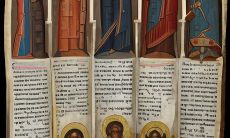Welcome to the One Holy Catholic and Apostolic Podcast, where we explore different aspects of Eastern Orthodox Christianity. I’m your host, and today we’re going to delve into the rich and profound world of the Philokalia. The Philokalia is a collection of texts written by various Eastern Orthodox Christian monks and hermits between the fourth and fifteenth centuries. It’s a compendium of spiritual wisdom and teachings that focus on the inner life of the Christian, the purification of the soul, and the attainment of spiritual perfection.
The Philokalia is a Greek term meaning “love of the beautiful” or “love of the good”, and it’s a fitting name for this collection of writings because it’s filled with beauty and goodness. In the Philokalia, we find a wealth of spiritual teachings that can guide us on our journey toward union with God.
One of the core teachings of the Philokalia is the practice of hesychasm, which is a method of prayer and meditation that involves stilling the mind and heart in order to attain a state of inner stillness and purity. This is seen as a necessary step in the spiritual journey toward union with God. The goal of hesychasm is to attain a state of inner stillness and purity, which allows the individual to experience the presence of God.
Another important teaching is the concept of the “nous,” which is often translated as “the eye of the soul.” The nous is the spiritual faculty that enables us to perceive God and the spiritual world, and it’s seen as being distinct from the intellect or reasoning faculty.
The Philokalia has had a profound impact on Eastern Orthodox spirituality. It’s been read and studied by countless monks, nuns, and laypeople over the centuries, and its teachings have influenced many aspects of Eastern Orthodox spiritual life, from prayer and meditation to iconography and liturgical practices. In fact, many of the prayers and hymns that are used in Eastern Orthodox worship are drawn directly from the Philokalia.
There are several translations of the Philokalia available in English, and I’d recommend starting with the four-volume set published by Faber and Faber. This edition includes a helpful introduction and footnotes that provide context and guidance for the reader. It’s also a good idea to read the Philokalia in the community with others, either through a study group or under the guidance of a spiritual director who is familiar with the tradition.
The teachings of the Philokalia have had a profound impact on the spiritual lives of Eastern Orthodox Christians, and they continue to inspire and guide us today. If you’re interested in exploring this tradition, I encourage you to dive into the Philokalia and discover the beauty and wisdom that it contains.
Thank you for listening to the One Holy Catholic and Apostolic Podcast. May the peace of God be with you.






